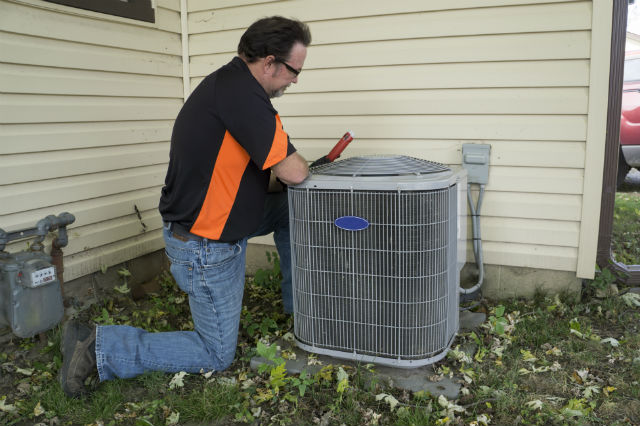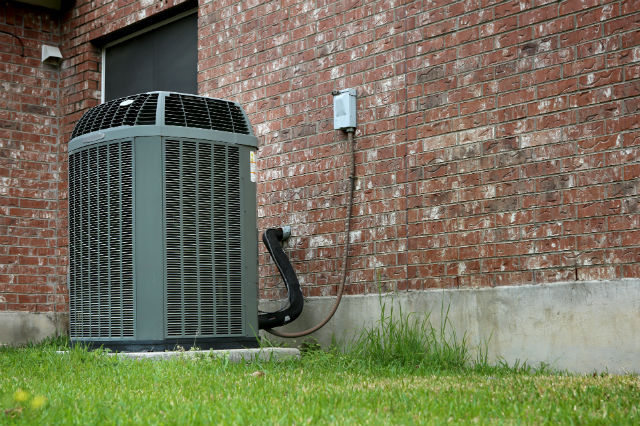Central air not cooling? Central air is one of the most comfortable facets of modern life. But how do you know when your central air system needs to be replaced? Sure, it might have some problems now and then, but it can be difficult to determine whether it just needs a tune-up or needs to be gutted entirely.
If your central air isn’t cooling your home the way it should, you might want to figure out whether you should get it repaired or replace it entirely. You want your air conditioning system to be efficient (both for the environment and for your wallet) while also keeping you comfortable and cool as a cucumber. And you don’t want costs from constant repairs to keep piling up.
How old is your AC system?
Most central air conditioning systems actually aren’t built to last more than twenty years. Once it gets up into that age range and your central air isn’t cooling, you have to start thinking about whether you want to repair or replace.
Think about how much longer you’re going to be living in your home, how often you use your AC, and how many more repairs you might need. If your AC system is more than 10 years old, it might actually be more cost-effective to replace it rather than repair it.
Old AC systems might even be dated. Many older systems use R-22, a refrigerant that’s being phased out to meet environmental regulations. It’s much more difficult to get your hands on R-22 than it used to be. If your system needs to be topped off with more refrigerant, it probably means that there’s a coolant leak. And if your old AC system is still using R-22, you’ll have to pay a pretty penny to get it repaired and refilled. It’s just supply and demand.
Is your utility spending increasing?
Heating and cooling accounts for about 44% of the average American’s utility costs, so the efficiency of your AC system can have a sizeable impact on your wallet. An unpleasant surprise in your utility spending is reason to believe that something is wrong with your AC system.
If you haven’t changed the way you’re using your air conditioning, yet your utility bills keep increasing anyway, it might be time to get a new central air system.

Is your house filled with dust?
Excessive dust and noise can also clue you in to any problems that might be going on in your AC system. Leaks in the ductwork can fill your house up with dust and dirt, no matter how much you clean your air conditioner’s filter. Perforations in the ductwork will also increase your AC system’s operating costs, since it has to work twice as hard to compensate for the leakage.
New AC systems will have the added benefit of improving your home’s air quality, by reducing indoor air pollution. A properly-functioning AC system will circulate the air in the interior of your home, and filter out pet dander, dust, pollen and other irritants.
Always consult with a professional first to determine if a dust issue can be resolved by simply cleaning the ducts or if it is more serious.
Does your AC system sound haunted?
Whenever you turn your air conditioning on, does it sound like you’re waking the dead? This clicking, grinding, rattling and hissing is not the work of a ghost—it’s your central air.
If your central air conditioning makes a lot of noise whenever it’s in operation, that might mean that your duct system is too small for the square footage of the house that it’s tasked with cooling down. It could also mean that your system is leaking refrigerant, which is a serious problem that requires the attention of a professional HVAC technician. A new system with properly sized and sealed ductworks will minimize the noise to a low purr.
Is your central air not cooling consistently?
Did you know that your central air system also removes humidity from the air? An effective heating and cooling system can often be key to quality of life, especially during the more intense parts of the year. You shouldn’t settle for a hot and humid house when you have central air.
Your AC system is supposed to maintain consistent temperatures and humidity levels throughout the house. If you notice that your living room always feels like a tropical rainforest compared to the other rooms in your house, your faulty central air system could be the culprit.
A new central air system is an investment in your home, with some hefty upfront costs. It’s normal to feel a little skittish about making the change, but it will save you money in the long run. A new AC system will eliminate the cost of constant repairs, and it will also lower your utility bills. An up-to-date system will also increase your home’s resale value.
If you’re having trouble choosing a new system that’s right for you, look to the professionals. Petro’s team of professional HVAC technicians are trained, experienced and highly qualified. They can help you choose the latest and most energy efficient AC system for your home.
In fact, AAA members can get $200 off any new heating or AC system from Petro. Just mention the code “AAA” to save on cooling your home.
How did you know it was time to upgrade your air conditioning? Let us know in the comments below!
2 Thoughts on “When to Replace Your Central AC System”
Leave A Comment
Comments are subject to moderation and may or may not be published at the editor’s discretion. Only comments that are relevant to the article and add value to the Your AAA community will be considered. Comments may be edited for clarity and length.


















Why do all your articles seem like you are trying to sell us products and not represent us as consumers? You even advertise discounts if you use certain companies. Very worrisome about your ethics.
Thank you for your comment. The Your AAA Extra emails that we send out periodically are sponsored by advertisers. They are designed to offer actionable information to our readers and promote the sponsor’s products as well. You can visit your account page at https://magazine.northeast.aaa.com/account/ to adjust your newsletter preferences if you do not wish to receive these communications.
– Dana